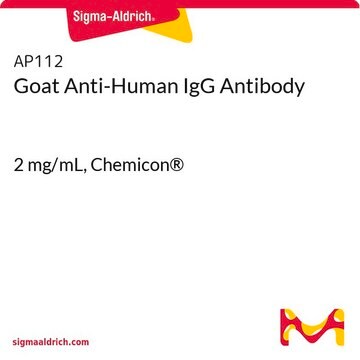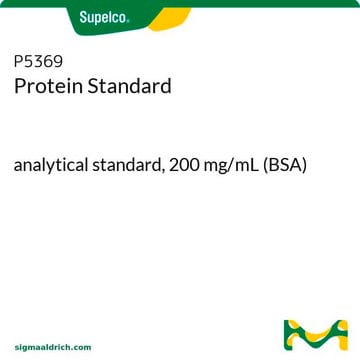B8667
Bovine Serum Albumin solution
20 mg/mL in H2O, low bioburden, protease free, for molecular biology
Synonym(s):
Albumin solution from bovine serum, BSA solution
About This Item
Recommended Products
biological source
bovine
Quality Level
grade
for molecular biology
product line
BioReagent
Assay
20-22 mg/mL protein basis (biuret)
form
solution
quality
non-acetylated
purified by
heat shock fractionation
contains
does not contain preservative
origin
USA origin
concentration
20 mg/mL in H2O
20-22 mg/mL Biuret
technique(s)
PCR: suitable
impurities
Alakaline phosphatase, none detected
DNase, none detected
Endonuclease, none detected
Exonuclease, none detected
NICKase, none detected
peroxidase, none detected
<10.0 cfu/mL Total microbial count
UniProt accession no.
foreign activity
Alkaline Phosphatase free
DNase free
DNase, RNase, NICKase, protease, peroxidase and alkaline phosphatase, none detected
NICKase free
Peroxidase free
Protease free
RNase free
shipped in
dry ice
storage temp.
−20°C
Gene Information
bovine ... ALB(280717)
Looking for similar products? Visit Product Comparison Guide
Application
BSA has various uses in molecular biology applications, such as:
- As an added component in solutions of enzymes or of other proteins, to prevent adhesion of the enzyme or other protein of interest to the reaction tube surface or to pipette surfaces
- As an inert enzyme or protein stabilizer during incubation, to allow the enzyme or protein of interest to function properly
Features and Benefits
- Alkaline Phosphatase-free
- DNase-free / Exonuclease-free
- Nickase-free / Endonuclease-free
- Protease-free
- RNase-free
Storage Class Code
12 - Non Combustible Liquids
WGK
WGK 2
Flash Point(F)
Not applicable
Flash Point(C)
Not applicable
Personal Protective Equipment
Certificates of Analysis (COA)
Search for Certificates of Analysis (COA) by entering the products Lot/Batch Number. Lot and Batch Numbers can be found on a product’s label following the words ‘Lot’ or ‘Batch’.
Already Own This Product?
Find documentation for the products that you have recently purchased in the Document Library.
Customers Also Viewed
Our team of scientists has experience in all areas of research including Life Science, Material Science, Chemical Synthesis, Chromatography, Analytical and many others.
Contact Technical Service







